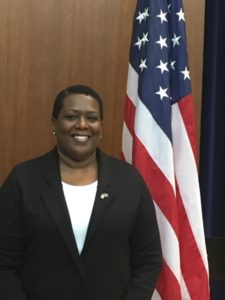Angela Mauney is an expert in cybersecurity and network security and privacy — and a doctoral student in the School of Education.
For nearly 20 years, Mauney has developed her technical skills, focusing on networks and security. This led to her current role as a cybersecurity management analyst for the U.S. Department of State, where she has a top secret security clearance — the highest security clearance level available. “As a child, and while I was in the Army, I was fascinated by how things work,” she says. “I was always taking things apart and putting them back together — that fascination led me to a career in the IT industry.”
 It’s not only her work at the Department of State, however, that makes Mauney an interesting person. Her background includes a childhood spent in Europe, military service, studying within an honors program, and teaching adults in university and community college environments — which is how Mauney ended up in the school’s Higher Education Leadership Ph.D. specialization, rather than a computer science doctoral program.
It’s not only her work at the Department of State, however, that makes Mauney an interesting person. Her background includes a childhood spent in Europe, military service, studying within an honors program, and teaching adults in university and community college environments — which is how Mauney ended up in the school’s Higher Education Leadership Ph.D. specialization, rather than a computer science doctoral program.
A self-described “Army brat” who moved frequently as the child of an Army officer, Mauney followed in the footsteps of her father by serving in the Army herself. After her honorable discharge, she used her veteran education benefits to earn a degree in telecommunication network management, then interned at Bell South. Intrigued by the potential of the Internet, Mauney next pursued an M.B.A. with a concentration in network security, a journey that would fuel her interest in online security.
While teaching basic technology courses at an Atlanta university, Mauney noticed that some of the students in her classes were nontraditional women, many of them with children at home, who were re-entering higher education as a way to improve their job opportunities in a highly competitive market. As she worked with and mentored these students, Mauney realized many of these women lacked basic technology skills and had been passed over for new jobs or promotions in favor of students with more recently completed education experiences often steeped in technology. Some of these nontraditional students were embarrassed to admit their challenges in understanding technology. In her classroom, Mauney found that pairing these students with younger students helped to support learning; additionally, she would work with struggling students individually and on her own time, ensuring they finished her courses feeling competent and confident in using basic technology.
“I love teaching,” says Mauney, “and I enjoyed working closely with these students. I care about this demographic — women returning to higher education — learning.”
She began her doctoral studies in the fall of 2009, pursuing a Ph.D. in Community College Leadership, a program that merged with the College and University program in 2011 to become the Higher Education Leadership program. Working full-time in a demanding position means that her pursuit of a doctoral degree is a long-term goal.
“It’s challenging, but rewarding,” she says. “My [dissertation] committee members have encouraged me, offered me ‘tough love,’ and supported me through the writing process.”
“Angela has been very diligent in pursuing the knowledge needed to complete her dissertation,” says Don Quick, an assistant professor in the School of Education and a member of Mauney’s dissertation committee. “She’s a very fine individual to work with.”
Her dissertation, “Community College Experience as Perceived by Non-Traditional African-American Female Students,” focuses on single African-American women who are over 25 years old, with a child or children under the age of 17 living at home, who have a college transcript and have decided to return to school to complete their remaining credit hours to graduate. With her dissertation nearly complete, Mauney was recently approved to begin her research on the classroom experiences, financial need and aid, and learning styles of said students at Anne Arundel Community College in Annapolis, Maryland.
“I’m looking to see if the information out there supports my findings, or if it is incorrect,” says Mauney. She hopes to defend her thesis in Spring 2017. After completing her degree, Mauney’s goal is to teach, in either a higher education environment or as a technical trainer for the Department of State.